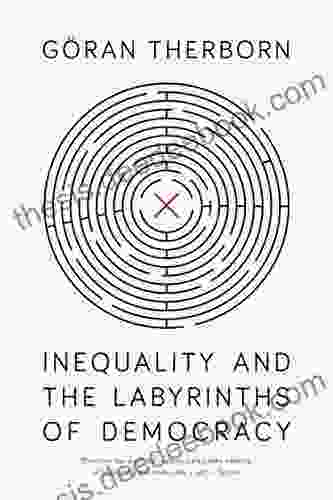Inequality and the Labyrinths of Democracy: Unraveling the Intricate Web of Social and Economic Disparities

:
Democracy, a cherished ideal of self-governance and equality, stands as a beacon of hope for societies striving towards a just and fair world. However, beneath the facade of democratic principles, a persistent undercurrent of inequality lurks, casting a shadow over the promise of an equitable society. This article delves into the complex relationship between inequality and democracy, exploring the intricate connections and the challenges they pose.
5 out of 5
| Language | : | English |
| File size | : | 532 KB |
| Text-to-Speech | : | Enabled |
| Screen Reader | : | Supported |
| Enhanced typesetting | : | Enabled |
| Word Wise | : | Enabled |
| Print length | : | 204 pages |

Section 1: Inequality as a Threat to Democracy
Inequality, defined as disparities in wealth, income, and opportunities, poses a significant threat to the foundations of democracy. When a society becomes highly stratified, with a small elite enjoying disproportionate economic and political power, the voices of the marginalized and the voiceless are often silenced.
This economic and political disparity can lead to the erosion of trust in democratic institutions, as citizens perceive a system that favors the wealthy and powerful over the needs of the majority. Furthermore, high levels of inequality can foster social unrest, as those who feel left behind and disenfranchised may resort to protests or even violence to demand a fairer share of society's resources.
1.1 Income Inequality and Political Influence:
Income inequality is a particularly pernicious form of inequality, as it can translate into disproportionate political influence. The wealthy and corporations can leverage their financial resources to lobby for policies that favor their interests, often at the expense of the poor and vulnerable. This can result in laws and regulations that reinforce existing inequalities, perpetuating a vicious cycle that undermines democratic principles.
1.2 Wealth Inequality and Economic Power:
Wealth inequality, on the other hand, manifests as vast disparities in the ownership of assets, such as real estate, stocks, and businesses. The concentration of wealth in the hands of a few individuals or families can lead to the emergence of economic oligopolies and monopolies, which can stifle competition and innovation, further exacerbating inequality.
Section 2: Democracy as a Tool for Reducing Inequality
While inequality can undermine democracy, democracy itself can also be a powerful tool for reducing inequality. Through the principles of representation and accountability, democratic systems provide a platform for the voices of the marginalized to be heard and for policies to be enacted that address the root causes of inequality.
Progressive taxation, social welfare programs, and labor regulations are examples of policies that democracies can implement to create a more equitable society. These measures can help redistribute wealth and income, provide a safety net for the vulnerable, and ensure that everyone has fair access to education, healthcare, and other essential services.
2.1 Redistributive Policies and Social Mobility:
Redistributive policies, such as progressive taxation, aim to reduce economic disparities by transferring resources from the wealthy to the poor and middle class. This can help create a more level playing field for individuals from disadvantaged backgrounds, increasing their opportunities for social mobility and economic success.
2.2 Social Welfare Programs and Inclusive Growth:
Social welfare programs, such as universal healthcare, affordable housing, and quality education, can significantly reduce inequality by providing essential services to all members of society, regardless of their income or status. These programs promote inclusive growth, ensuring that the benefits of economic progress are shared more broadly.
Section 3: The Complex Interplay and Challenges
The relationship between inequality and democracy is dynamic and complex, with multiple factors interacting to create an intricate web of challenges. Economic globalization, technological advancements, and demographic shifts can all contribute to inequality and strain the fabric of democracy.
Globalization, while offering opportunities for growth, can also lead to job losses and wage stagnation in certain sectors, especially in developed countries. Technological advancements, such as automation and artificial intelligence, can also have a polarizing effect, creating new high-paying jobs for some while displacing others.
3.1 Economic Globalization and Labor Markets:
Economic globalization has led to increased interdependence between countries, but it has also created challenges for labor markets in some regions. The movement of jobs to lower-wage countries can result in job losses and wage declines for workers in developed countries, contributing to income inequality.
3.2 Technological Advancements and Job Polarization:
Technological advancements, while driving economic growth, can also lead to job polarization. Automation and artificial intelligence technologies have the potential to replace certain types of jobs, particularly those that involve routine or manual tasks. This can create a divide between highly skilled workers, who are in demand in the new economy, and low-skilled workers, who may face unemployment or underemployment.
Section 4: Strategies for Mitigating Inequality
Addressing the challenges of inequality and its impact on democracy requires a comprehensive approach that involves both economic and political strategies. Governments, businesses, and civil society organizations must work together to create a more just and equitable society.
Investing in education, promoting sustainable economic growth, and strengthening labor unions are essential elements of a multifaceted approach to reducing inequality. Additionally, addressing the political influence of money in politics and promoting transparency and accountability in government institutions are crucial to ensuring that democratic systems are responsive to the needs of all citizens.
4.1 Education and Human Capital Development:
Investing in education is a long-term strategy for reducing inequality. Education provides individuals with the skills and knowledge necessary to succeed in the modern economy, increasing their earning potential and improving their chances of upward mobility.
4.2 Sustainable Economic Growth and Job Creation:
Promoting sustainable economic growth that creates quality jobs for all is essential to reducing inequality. Policies that support small businesses, encourage innovation, and invest in infrastructure can help drive inclusive growth and create opportunities for everyone.
Section 5:
Inequality and democracy are intertwined in a complex and challenging relationship. While inequality can undermine democratic principles, democracy itself can also be a powerful tool for reducing inequality. By understanding the mechanisms through which inequality arises and the ways in which it impacts democracy, we can develop strategies to mitigate its effects and build more just and equitable societies.
Addressing the challenges of inequality requires a concerted effort from all sectors of society. Governments must implement policies that promote economic opportunity, social justice, and political equality. Businesses must prioritize sustainability and social responsibility, recognizing that their success is tied to the well-being of the communities they operate in.
Ultimately, the fight against inequality is a fight for the soul of democracy. By tackling the root causes of inequality, empowering the marginalized, and ensuring that every citizen has a fair chance to succeed, we can create a society that truly lives up to the ideals of democracy: a society where all voices are heard, all have equal opportunities, and all share in the benefits of progress.
5 out of 5
| Language | : | English |
| File size | : | 532 KB |
| Text-to-Speech | : | Enabled |
| Screen Reader | : | Supported |
| Enhanced typesetting | : | Enabled |
| Word Wise | : | Enabled |
| Print length | : | 204 pages |
Do you want to contribute by writing guest posts on this blog?
Please contact us and send us a resume of previous articles that you have written.
 Book
Book Novel
Novel Page
Page Chapter
Chapter Text
Text Story
Story Reader
Reader Library
Library Paperback
Paperback E-book
E-book Newspaper
Newspaper Sentence
Sentence Glossary
Glossary Preface
Preface Footnote
Footnote Manuscript
Manuscript Codex
Codex Bestseller
Bestseller Classics
Classics Library card
Library card Narrative
Narrative Memoir
Memoir Reference
Reference Thesaurus
Thesaurus Narrator
Narrator Character
Character Resolution
Resolution Librarian
Librarian Stacks
Stacks Periodicals
Periodicals Scholarly
Scholarly Rare Books
Rare Books Special Collections
Special Collections Thesis
Thesis Dissertation
Dissertation Awards
Awards Reading List
Reading List Book Club
Book Club Theory
Theory Textbooks
Textbooks Jayati Ghosh
Jayati Ghosh Herbert Jones
Herbert Jones A Bean
A Bean Nicholas Khoo
Nicholas Khoo Nick Martell
Nick Martell Myles Mcleod
Myles Mcleod Caryl Hart
Caryl Hart Robert E Shadwick
Robert E Shadwick Ethan Cerami
Ethan Cerami Barnabas Chiboboka
Barnabas Chiboboka Janette Yoke
Janette Yoke A Bandey
A Bandey Vicky Y W Wong
Vicky Y W Wong Beautiful World Escapes
Beautiful World Escapes Hana Meihan Davis
Hana Meihan Davis Jason Rohan
Jason Rohan 50minutes Com
50minutes Com David Henry Hwang
David Henry Hwang Gemma Cobb
Gemma Cobb Robert Munro
Robert Munro
Light bulbAdvertise smarter! Our strategic ad space ensures maximum exposure. Reserve your spot today!

 Charlie ScottThe Ultimate Guide to a Happy and Healthy Pet: Empowering Pet Owners with...
Charlie ScottThe Ultimate Guide to a Happy and Healthy Pet: Empowering Pet Owners with... Jedidiah HayesFollow ·3k
Jedidiah HayesFollow ·3k W.H. AudenFollow ·10.6k
W.H. AudenFollow ·10.6k Thomas PynchonFollow ·12.7k
Thomas PynchonFollow ·12.7k Christian CarterFollow ·6.1k
Christian CarterFollow ·6.1k Ira CoxFollow ·6.7k
Ira CoxFollow ·6.7k Jerry WardFollow ·9.6k
Jerry WardFollow ·9.6k Fernando PessoaFollow ·14.4k
Fernando PessoaFollow ·14.4k Felix CarterFollow ·4.5k
Felix CarterFollow ·4.5k

 Russell Mitchell
Russell MitchellGCSE Set Text Student Edition: Collins Classroom Classics...
The GCSE Set Text Student Edition: Collins...

 Ralph Turner
Ralph TurnerSix Sigma Lean Green Belt Training for Beginners with...
What is Six...

 Travis Foster
Travis Foster10 Life-Changing Lessons I Learned When I Was Single
Being single can...

 Jermaine Powell
Jermaine PowellOne Great Insight Is Worth a Thousand Good Ideas
In the competitive and...
5 out of 5
| Language | : | English |
| File size | : | 532 KB |
| Text-to-Speech | : | Enabled |
| Screen Reader | : | Supported |
| Enhanced typesetting | : | Enabled |
| Word Wise | : | Enabled |
| Print length | : | 204 pages |














